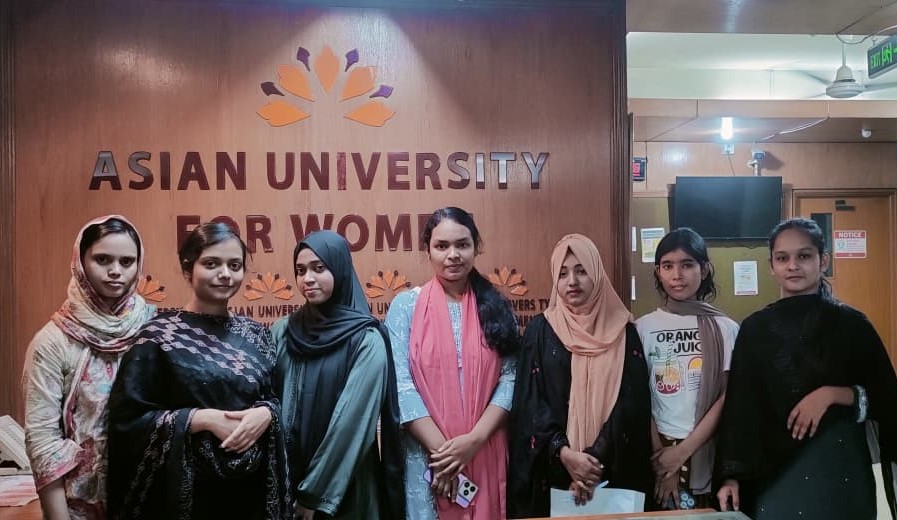Booksellers campaigning for reading culture strongly oppose the notion that audio-visual content will replace physical books someday.
*By Sadiqur Rahman
CREATING A READING CULTURE
Founded in Chattogram 14 years back, bookstore Baatighar with its 5000 square feet outlet in Bangla Motor, Dhaka has now become an attractive book hub for city-dwellers. Since December 2017, the book publication and marketing house has been maintaining its stacks with a collection of more than one lakh books from diversified genres.
Baatighar publisher Dipankar Das thinks that the availability of quality books, both imported and local, helps revive people’s interest in reading. He tells ICE Business Times that Baatighar, with ardent effort, has survived the closing down of many such similar enterprises due to a lack of demand. However, Baatighar finds itself filled with a remarkable number of young and matured persons coming to read as well as purchase their favourite books.

Confident that the initiative is promoting a reading culture in the country, Dipankar says, ‘Recently we have noticed that many school-going children insist their parents take them to the bookstore as they are interested in a varied genre of extracurricular books’. Baatighar displays 40 percent English titles and 60 percent Bangla titles, authored by both Bangladeshi and foreign writers.
Although there are no statistics on Baatighar customers, Dipankar claims that the publication house is connected with more than fifty percent of the readers in Bangladesh.
PAPERBACKS STILL POPULAR
On November 2017, Bengal Boi–a concern of Bengal Foundation– launched its book hub in a 12,000 square feet space in Lalmatia. Visitors can relax there, taste local snacks and drink tea while flipping pages of interesting books, and if necessary, get some titles to take home.
Bengal Boi’s Head of operations, Mohammad Ataur Rahman says that their main objective is being materialized by giving people a free space to read. They do not insist that their visitors purchase anything, but rather encourage that they flip through anything that looks interesting.
Registered visitors may also collect one used book from the designated displays on the ground floor of Bengal Boi yard named Baithak Khana in exchange for two donated books. The second floor of the building is dedicated to children and the third floor is named Comicache, hosting a rare collection of comics. The whole compound has now been turned into a community hub where differently-abled people can also access the facilities.
The ratio of Bangla to English titles in Bengal Boi’s stock fluctuates depending on trends. For example, the bookstore stockpiles more Bangla titles than English during February, the month of the historic Bangla Language Movement and Amar Ekushey Book Fair. ‘In general, Bengal Boi displays 65 percent Bangla titles and 35 percent English titles,’ says ARM Akhter Hossain, Deputy Manager (Brand and Communication) of Bengal Foundation.
Ataur says, ‘From the beginning, we took up the challenge to promote reading amongst people by offering free space for reading books. The more they flip pages, the more they are engaged with the book. Sometimes, in the end, they decide to take it’.

Pathak Shamabesh Publications officials believe that they are promoting a reading culture in the country through offering readers’ a friendly environment at its premises and by hosting a rich collection of books and state-of-the-art displays. Established in 1987, the publication house has since been trading imported and locally printed books. Its first outlet at Aziz Super Market in Shahbag was among the trusted sources of quality books. In 2011, Pathak Shamabesh recently launched its 4000 square feet bookstore at Shahbag accommodating more than one lakh books along with reading facilities.
Pathak Shamabesh maintains a 50:50 ratio in Bangla and English titles. Almost all of its English titles are imported. The book trading house has business deals with international publishers including Penguin Publications.
‘There is no restriction on reading books even if the readers avoid purchasing the book from us,’ Wahidul says.
Bookstore attendants’ cordial cooperation in finding interesting titles from stacks and hospitality with local snacks and tea make the visitors feel welcome at Pathak Shamabesh. They also host activities like literary symposiums and group chats. Pathak Shamabesh has more than 50,000 registered buyers who get updates on new arrivals.
PROTHOMA PICKING UP
Zafar Ahmad Rashed, manager of Prothoma Prokashon, tells ICE Business Times that Prothoma prioritizes the publication of books containing aesthetic and creative features. Prothoma –an initiative of Bangla daily Prothom Alo– launched its operations in 2009.
Zafar says, ‘Publication houses alone are unable to create pools of readers as people’s reading habits grow with a social movement’. He, however, thinks that the possibility of increasing the number of readers will be created if the readers can avail quality books.

For the last nine years, Prothoma has published about 500 titles. Although Zafar is not fully satisfied with the achievement, he says that the growth of Prothoma, as well as the number of its customers, is on an upward trend.
Prothoma is mainly a publisher of Bangla titles. Meanwhile, it has published a number of English titles authored by local and foreign writers. Only three to four percent of Prothoma published titles are the English language based, Zafar says.
Booksellers campaigning for reading culture strongly oppose the notion that audio-visual content will replace physical books someday.
‘I do not think that the increase of audio-visual content largely affects the demand of physical books,’ says Dipankar. Technological advancement has accelerated the promotion of audio-visual study in Europe for the last 20 years. But this does little to affect the book publishing business in the first world, he says, expressing that reading physical books is still more popular than reading e-books.
Open access to books offered by Bengal Boi has made physical books a favorite, as Ataur says bookworms are still fond of the smell of freshly printed books.
Explaining the challenges of the book business, Dipankar explains that an efficient supply chain has not been developed in the Bangladeshi publication industry due to a lack of professionalism. “Old-fashioned customer services often create miscommunication among stakeholders.’ he adds.
FROM PAPER-TRAIL TO E-TRAIL
To solve the challenges, Baatighar always maintains a good network with clients to make its supply chain smooth. ‘With discussion, more than one time if needed, we try to solve problems so that no client is discriminated by our services. Baatighar officials, on a regular basis, discuss with shop attendants about how to improve customer services.’
Connecting clients with good behavior is Baatighar’s brand strategy. Baatighar’s official logo depicts a lighthouse. Dipankar says, ‘We consider the book as a crucial tool for human enlightenment, Baatighar offers its customers the same services as a lighthouse.’
Although Baatighar’s e-commerce is not yet in full swing, readers across the country can order using its Facebook page. Their page already has 1 lakh members.
Prothoma and Bengal Boi are due to launch their e-commerce sites soon.
In collaboration with Bengal Publications, Prothoma organizes a number of book fairs across the country to strengthen the book supply chain. Moreover, Prothoma participates in the book fairs organized by the Academic and Creative Publishers Association of Bangladesh. Prothoma also works with a forum titled Koishar Tarunyer Boi which regularly organizes small-scale book fair at school premises to reach children and teenagers in their very school compound.
Prothoma’s main brand strategy is to provide readers with quality books. Its officials believe that negligence in the publication will not help the growth of the particular brand. Before publishing a book, at least two Prothoma staff study the new manuscripts before preliminary printing. Then more than one expert edits the prints and sits with the author to get crucial inputs. When the author gives consent and three or more proofreadings are done, Prothoma starts processing of the final print.
Prothoma’s book stock is maintained by software-based data so that no title can vanish from the market.
UNDERSTANDING TRENDS
To understand trends, Prothoma evaluates statistics coming from each book fair it participates in. Zafar says, ‘We try to understand the reader’s’ interest. There is a difference between the fairs held in Dhaka and those outside Dhaka. After analyzing the data, we reshuffle our stock’.
‘Once, fictions were in the highest demand. But now we notice that readers show more interest for non-fiction containing political and historical elements,’ Zafar says.
Baatighar stocks books according to ongoing trends. As Dipankar says, ‘We try to see ourselves as readers. Our stock gets reshuffled at three-month intervals’.
Wahidul says customers of Pathak Shamabesh show interest for books that are supplementary to professional skills development.
Bengal Boi constantly reshuffles its book stock following upcoming trends. According to its officials, readers, especially professionals, often ask for non-fiction while youths demand fiction.
Pathak Shamabesh’s sales do well during the month-long Ekushey Book Fair on the Bangladesh Academy premises and Suhrawardy Udyan in Dhaka. In contrary, Bengal Boi’s book sales drop at this time. However, most publishers admit that the largest book fair highly influences the local publishing industry.
READING BEYOND CULTURAL FESTIVALS
Dhaka Lit Fest has also started to show its potential. Many publishers think that the fairs can not only grab media attention but also help get special support from the government. The fairs are like cultural festivals for the readers and publishers. For such big events, the communities of publishers, writers and readers become active. However, some of the emerging publishers try to capitalize on these occasions to cash in on their annual profit.
Dipankar, who believes that festivals have very short-term effects, thinks that book publishers should not be a single month or fair centric. He says, ‘People’s book reading habit must not grow to depend merely on hypes of the festive season’.
Zafar shares his experience, ‘Despite constant reminders, writers tend to provide manuscripts in October, giving only three months for final print prior to the upcoming Ekushey Book Fair.
He finds that the giant book fair has restricted the community’s activism to three mere months. According to Zafar, many owners of press and bookbinding firms hire seasonal staff accordingly. For this, he thinks, no skilled professionalism in such a sensitive job can develop.
CAMPAIGNING FOR LIBRARIES
Availability of quality manuscripts is crucial for running the publication business throughout the year. To promote the message, Prothoma initiates collection of manuscripts since March of a year and continues tile June. Zafar says, ‘Earning of one month may not be adequate to survive the rest of the year. That’s why we are trying to motivate writers saying that books published during March to January would be presented as new titles for the Ekushey Book Fair’.
Private-run publishers strongly feel that the government should promote a vibrant library campaign across the country through activating the divisional and district level book hubs with the latest publications.
Dipankar suggests that the Union Parishad-run information centers could be transformed into libraries to allow for grassroots access.
Bookstores pay 15 percent VAT, five percent higher than super shops. ‘To promote a culture of reading, tax waiver should be introduced to support booksellers,’ he says, citing the example of France where the same has been done.
Publishers also demand that the government purchase necessary books for its educational institutions in a systematic way. In the absence of coordination, policy support by the government would help to minimize the challenges.















